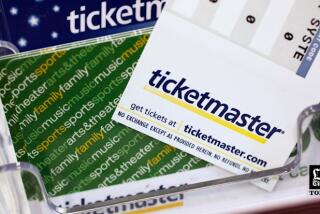Clipping Ticket Sellers’ Wings : American Airlines Sues Brokers Over Dealing in Frequent-Flier Awards
- Share via
NEW YORK — American Airlines has filed suit against three brokers it said were buying, selling and trading its frequent-flier awards, alleging that it loses “millions of dollars in revenues” as a result of such “abuse.”
The suits, filed Wednesday in U.S. District Courts in Texas, Utah and New York and announced by the company Thursday, seek an injunction against the three brokers to prevent them from selling or trading American’s AAdvantage frequent-flier awards. The suits also seek actual damages to be determined by the court and punitive damages of $5 million from each company. The alleged practices, the airline said, had been taking place since 1986.
For the record:
12:00 a.m. Sept. 4, 1988 For the Record
Los Angeles Times Sunday September 4, 1988 Home Edition Part 1 Page 2 Column 6 National Desk 3 inches; 82 words Type of Material: Correction
An illustration with a Friday story in the Business section about an American Airlines lawsuit against three brokers of frequent-flier awards displayed the names of some brokers who are not defendants in the suit. Neither The Flyer’s Choice nor Cheap Tickets Inc. nor brokers behind other ads in the illustration are defendants. The defendants are Texas Budget Flights, doing business as Texas Traveler of Ft. Worth; Platinum World Travel and the Coupon Connection, affiliated companies operating out of Salt Lake City; and American Coupon Exchange, of New York and Newport Beach.
The suits charge that the brokers bought the mileage award certificates--usually called coupons--from members and sold them to potential American Airlines customers. The airline also charged that the defendants procured and resold mileage certificates that were “obtained through computer theft, fraud and deception, all without compensation to American.”
“We simply cannot tolerate this situation,” said Lowell Duncan, American’s vice president for corporate communications. “We have an obligation to our AAdvantage members who do abide by the rules and to our paying customers to put a stop to this practice.”
The suits were filed against Texas Budget Flights, doing business as Texas Traveler of Ft. Worth, Platinum World Travel and the Coupon Connection, affiliated companies operating out of Salt Lake City, and American Coupon Exchange, which has offices in New York and Newport Beach.
An American Airlines spokeswoman said the airline has been aware of the practice for some time and has unsuccessfully tried to thwart the trading of the award certificates by warning its members in all AAdvantage club communications and by printing the rules on the certificates.
What apparently intensified the problem and triggered the airline’s current action was the advent of triple-mileage awards that have been given to frequent fliers by all of the nation’s major carriers since the start of the year. Such added bonuses, which are scheduled to end Dec. 31, have dramatically increased the carriers’ liability for free flights by members of their frequent-flier clubs.
Bruce Briggs, general manager of the Salt Lake City broker sued by American, said late Thursday: “We don’t like it (the suit) but we obviously have differences of opinion (with American) in what people should be allowed to do with the awards they have earned.”
Tonya K. Sweeten, manager of the Texas firm, declined to comment but said Briggs also spoke for her company.
Misuse of Marketing Tool
Neil Weisman, president of American Coupon Exchange, said he had not seen the suit but that he believes that frequent fliers should be allowed to give the certificates to anyone they want. If suits such as American’s succeed, he said, “the consumers are the losers. The airlines are trying to minimize their triple-mileage liability.”
American Airlines, which originated the frequent-flier program concept in 1981, still calls it the best airline marketing tool ever devised. But it maintains that the value of the program to the company is eliminated when the tickets are sold to travelers with whom American has no “customer loyalty relationship.”
Airline officials estimated Thursday that there are between 25 and 35 brokers nationwide who trade in such awards on a full-time basis. There are others who do it part time.
The brokers deal almost exclusively in first-class tickets because there are many discounts on coach tickets but hardly any on first-class travel. American said 85% of its customers already fly on some kind of a discount ticket.
A source in the brokerage business said the brokers usually re-sell the frequent-flier mileage coupons for about 30% more than they pay for them but still at a considerable discount from the airlines’ official ticket prices. Travel agents reportedly often feel forced to deal with such brokers for competitive reasons.
It is difficult to thwart such practices since the airlines usually allow a frequent-flier club member to have an award certificate made out in the name of another person. And it often has been the case that a member has the airline make out the certificate with a name that has been supplied by a broker.
Some Out of Business
However, some airlines require that the person using an award certificate have the same last name as the frequent-flier club member. And there have been occasions when a violation of the rules has been discovered at the boarding gate, and tickets have been confiscated.
The American Airlines spokeswoman said: “We are losing revenue which we would be getting if the people who purchase from the brokers bought from us. And we are losing our relationship advantage which we have with our customers, which is not fair. The frequent-flier mileage we give out is supposed to award loyal customers.”
A number of the carriers have been attempting to fight the brokers. According to Travel Management Newsletter, the airlines have been filing an increasing number of suits against brokers in the past year and have received favorable decisions in several instances.
As a result, some brokers have already gone out of business. In a case filed against Premier Travel of San Diego and its affiliated Coupon Bank of San Diego in May, 1986, Trans World Airlines was awarded $65,000 in damages to cover the cost of tickets issued by the company after an injunction prohibited the firm from issuing tickets on TWA, American and United Airlines.
United and American, which also sued Coupon Bank, made out-of-court settlements with the firm.
In another case filed by TWA, a judge last March ruled in favor of the airline and issued a permanent injunction against American Coupon Exchange that prevents it from brokering TWA coupons.
Northwest Airlines is awaiting a ruling in a suit it filed against a Bloomington, Minn., firm and its owner for “illegal brokering” of frequent-flier tickets.
More to Read
Inside the business of entertainment
The Wide Shot brings you news, analysis and insights on everything from streaming wars to production — and what it all means for the future.
You may occasionally receive promotional content from the Los Angeles Times.










